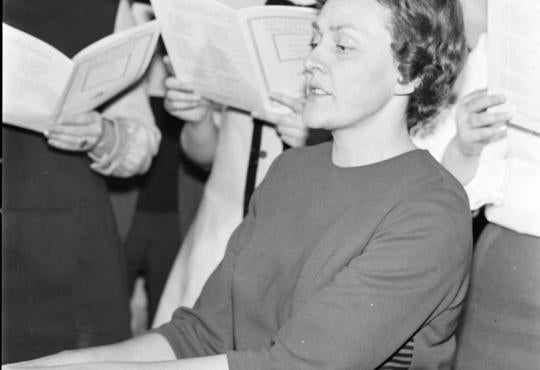When Grebel was founded in 1963, no one could have anticipated the growth of the Music program and the central role Music would play in giving voice to the College’s mission in the ensuing 55 years. Despite the misgivings of Grebel President Winfield Fretz about launching a degree program in Music (deemed “not advisable” due to the considerable cost), the unique identity of the Music program nevertheless grew out of the very founding principles of the College. And these same ideals continue to nurture the Music program’s focus, direction, and sense of mission on the campus of the University of Waterloo in the 21st century.
The College was open to testing the interest in Music among Waterloo students and therefore hired Helen Martens in 1965 to teach two courses linking Music, Fine Arts, and Literature. From the beginning, Music sought to embody its mission “to engage students in the study of music within the context of the liberal arts” and to “equip them with skills, knowledge, and a multi-dimensional understanding of music,” goals that have set the tone for the development of the program for more than fifty years.
By the end of Fretz’s tenure as president in 1973, Music enrolment and offerings had expanded so steadily that two new music degree programs were approved by the University Senate in 1974. The 3-year General Bachelor of Arts and the 4-year Honours BA in Music were first awarded in 1977, the same year that the Music program was formally established as a department within the Faculty of Arts. As enrolment soared in the following years, the Music Department expanded its faculty, eventually reaching a complement of six full-time faculty at its peak, before the retirement of Martens and Wilbur Maust in the 1990s. Since that time, the Music program has undergone expansion in all areas—in its innovative curriculum, in course enrolments of up to 2,000 per year, in its faculty complement, and in the number and size of ensembles. A new Music wing in the academic building was completed in 2014, replete with a classroom, ensemble room, digital lab, and new teaching and practice spaces.
Thanks to the liberal arts focus of the program within the Faculty of Arts, the Music curriculum expanded beyond the core areas of history, theory, and performance. Many creative courses in the 1970s and 1980s put the Music Department at the forefront of development in post-secondary music education, including Maust’s Music and Culture course in Vienna, and courses in Popular Music, Jazz, Aesthetics, Hymnody and Worship, Women and Music, Music and Technology, and the Psychology of Music. The innovative curriculum focused on deeper exploration of musical intersections with other disciplines and the connections between music and the world around us—an emphasis that still informs the program.
In recent years, the Music program has continued to present distinctive offerings, including the Church Music and Worship program, first offered as a minor, option, and diploma in 1997, and more recent specializations in “Music in Global Context” and “Music and Peace.” Additionally, the travel and culture courses have expanded to include South Africa, London and Leipzig, and in the coming years, the Baltics (in 2019) and Bali, Indonesia (in 2020).
The last five years have seen a dramatic transition in the make-up of the full-time faculty, owing to the retirement of three long-serving and influential members (Leonard Enns, Carol Ann Weaver, and Ken Hull) and the hiring of four new members (Mark Vuorinen, Maisie Sum, Karen Sunabacka, and Kate Steiner). In July 2013, the complement of full-time faculty increased to five with an appointment in Global Music, fulfilling a long-standing commitment to expand the Department’s course offerings to include music of other cultures and hands-on experience with cross-cultural music-making in a world ensemble.
To realize the experiential mandate of the Global Music curriculum, the Department added a Balinese gamelan ensemble in fall 2013 (directed by Artist-in-Residence, I Dewa Made Suparta) and the College invested in a full gamelan from Bali in 2016. In fall 2017, we further expanded our ensemble offerings by assuming ongoing formal responsibility of orchestra@uwaterloo, formerly an independent ensemble made up of students, faculty, and staff.
Throughout the many years since its inception, the Music Department remains strongly rooted in the Mennonite heritage of the College, fostering a sense of service, community, inclusiveness, mutual support, and hospitality. Music classes are filled with students from all disciplines across campus, providing a rich diversity of viewpoints. The seven ensembles provide a welcome respite to hundreds of students each term and an opportunity to develop their musical gifts in an atmosphere where all are welcome and valued.






